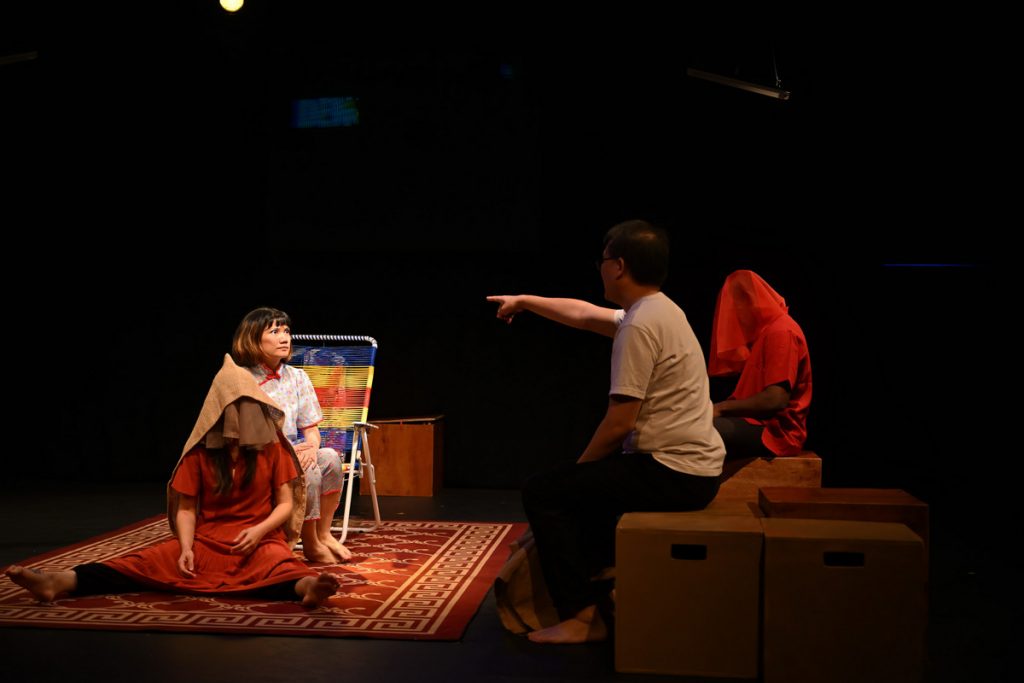- Views2436
- Likes0
 Opium at Closing Time
Opium at Closing Time
By Amberjade Arts
20 October – 30 October 2022
Damansara Performing Arts Centre
REVIEW BY TICKET TIGER
Memories are malleable and unreliable. They tease the present, show up unannounced, shapeshift, then slip away. We think the past is set in stone, that “History is history”. Yet, as people, we often choose to ignore or leave old pains unmentioned and in doing so hope to forget. We distort, reinterpret, ignore and gloss over facts to serve our present needs: to forget, to blame or to justify. As a nation we do the same.
Opium at Closing Time explores themes of failing memories and dissolving reality in Yen, a woman whose very grasp of time is slipping away due to Alzheimer’s. Written and directed by Tarrant Kwok, Opium is the maiden full-length production for both playwright and new production house Amberjade Arts.
Yen (Alexis Wong) is in her twilight years, taken care of by her son, Chai (Samuel Low). Their mother-son, patient-caretaker dynamic is the backdrop against which Yen’s life story unfolds through non-linear flashbacks. As scenes and people from Yen’s past intrude into her present in disjointed vignettes, we piece together the narrative of her life.
Yen struggles to comprehend her present reality and, by extension, herself. In an early scene, she wants to go to Sudirman’s famous concert in Chow Kit, desperately asking Chai to fetch her a cheongsam. Chai reminds her she is in Penang, Kuala Lumpur is far away and her cheongsams have been sold. Also, Sudirman is dead. Yen wants to go to his funeral instead. The problem is Sudirman died decades ago.
It’s Chai’s repeated attempts to reel his mother back to her present that abruptly interrupt her many brushes with her past. Relatives’ birthdays, visiting neighbours, her children, her grocery shop – to Yen, these are all urgent concerns in her mind. Chai is the unwelcome floodlight – he illuminates that these are from her past. He persuades her to focus on her actual needs: food, medication, hygiene, rest. This rhythm of past interrupting present interrupting past in Opium’s scenes creates a deliberate sense of disorientation, mirroring that of Yen’s mind.
Opium also attempts to tell the history of Malaysia writ small in Yen. It traverses many decades of the country’s history and portrays many characters in Yen’s long and richly storied life. These are played by a supporting cast of Grace Ng, Hannan Barakbah and Brendan Vinsent alongside Low. We face the events of Yen’s and Malaysia’s past: the horrors of World War 2 and the Japanese occupation, the Hartal in Penang in 1967, the Communist Emergency with its climate of fear and shifting allegiances, the unrest of the May 13th race riots. In Yen, we trace also the more subtle pains of modernisation, difficult family relationships and a failing body and mind.
Amidst this backdrop of change, war and political upheaval, we witness Yen’s growth from child to young woman to domineering matron, brazenly pushing against the degradation and sexism that follows her every decade. She has an indelible will to survive, even as her personal relationships and business both flourish and flounder. She develops a love-hate relationship with her opium smoking husband Ah Bee, and has fraught relationships with her children Kheong, Chai and Hui. In times of danger, Yen is also shielded and uplifted by many including her mother and an elderly Malay couple, Tuk and Kak Lin.
Opium is undoubtedly steeped in Kwok’s extensive historical research on early Malaya and Straits Settlements culture. In some scenes, the language spoken is Bahasa Tanjung, an old Malay dialect of Penang, now almost extinct. Yen intersperses Hokkien and Malay with English. She uses terms like kuli, kongsi, blood money. She refers to people as “the Indians”, “that Malay”. Kwok has a penchant for re-enacting history through his characters that ring of authenticity.
Opium does suffer from some technical and casting flaws: the cast’s diction and projection was at times muffled due to actors blocked away from the audience, the subtitles for non-English speech was sometimes out of sync, and Alexis Wong, while a very capable actress, comes off odd as a grandmother when she looks noticeably younger than her on-stage son, Low.
These flaws could be overlooked, but the greater problem in Opium is structural. It’s not that there’s no conflict to drive dramatic tension, it’s that there’s too much. Scenes move along so quickly to tell the next chapter of Yen’s life that there is sometimes no space to see how any one part changes her. The irony is that Opium portrays so much trauma that it has no time to show how any of it traumatises its central character. No doubt Kwok wanted to bring life to the past, but really, trying to portray 70 over years of Malaysian history brings a lot of breadth with little room for depth.
The same goes for the people in Yen’s past: there are so many of them either alluded to or portrayed, that, save for a few like Tuk, the audience doesn’t get to grasp Yen’s attachment to them and so doesn’t grow to care for any of them in particular.
The play’s best moments were when it portrayed Chai’s present struggles with Yen’s condition. It is those moments which are the most convincing, poignant and moving. Samuel Low is the standout actor; as Chai you cannot help but feel his pain and the buckets of patience he must muster. Yet even here it felt like a missed opportunity. We grasp of course how his mother’s deterioration must be hard to witness, but there must have been other prices he paid to be her primary caretaker – his career or family life, perhaps? That’s not really explored in Opium.
The central tragedy of the play is that Yen’s life is rich with stories, her spirit steely and her character complex, but she is turning into a pale shadow of her past self. With her mind fading, her stories disappear, and by extension the lesser-known stories of the country, too. It’s no doubt an ambitious premise, but in trying to portray Yen’s human struggle with Alzheimer’s simultaneously with her life as a mirror of the nation’s, Opium at times buckles under the weight of its own ambition.
Photos by Chan Kieng Ming and Chew Seng Cheong, courtesy of Amberjade Arts.
Ticket Tiger is a performing arts enthusiast roaming KL and its surrounding environs. He likes to chew on meaty productions and isn’t afraid to bite.



